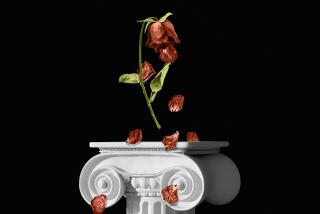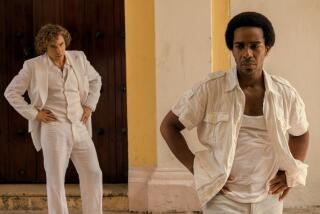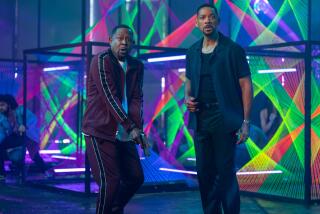Good Night, ‘Prince’
- Share via
After tonight, Will Smith is The Actor Formally Known as Fresh Prince.
With the final episode of the “Fresh Prince of Bel-Air” airing tonight, Smith’s show is one of the rare programs that weathered NBC’s struggling years--before Jay Leno was beating David Letterman and “ER” and “Friends” were household names. A testament to the show’s wide-ranging popularity is the fact that during its six-year run, “Fresh” has never been moved from its original Monday slot at 8 p.m.
Because Smith has gone from being a novelty rapper to a budding film star--with the 1995 hit “Bad Boys” and the likely summer blockbuster “Independence Day”--he decided this season would be the series’ last and that it was time for the show and actors to move on.
“You become a family” Smith, 27, said with some sadness. “On some weeks you spend more time with your TV family than you do with your real family. It’s hard to say goodbye to that atmosphere, but we felt like it was time. We’ve all grown as actors and as people, we had an incredibly talented cast, but the show is just limiting.
“TV is a good workout facility, where you get to work on your timing and other paces, but I think I’ve had enough time in the gym. Now I’m ready for the coach to put me in the game . . . motion pictures.”
“The Fresh Prince of Bel-Air” was an extension of a character Smith invented as his alter ego during his years as a Grammy-winning hip-hop artist, combined with the real-life experiences of Benny Medina, former Warner Brothers senior vice president of A&R;/general manager of Black Music.
The show, executive-produced by Quincy Jones and David Salzman, followed the social development of Will Smith, a streetwise kid from the wrong side of the tracks in Philadelphia. When life in the neighborhood becomes dangerous, he is sent to live with the Banks family, his relatives in Beverly Hills.
The racialized “fish out of water” motif has been a staple of the black sitcom, from “Diff’rent Strokes” to “Benson,” but what made the show different was how the social and generational differences were played.
The premises were hip-hop music (Smith) versus Tom Jones (the idol of Alfonso Ribeiro’s character Carlton Banks), urban values versus suburban ideals. The issue was the true “definition” of the black experience. Imagine Jimmie Walker’s character from the ‘70s staple “Good Times” sharing a house with the Huxtables of “The Cosby Show” and the questions of juxtaposition become more apparent.
But what made “The Fresh Prince” flourish is that Smith’s playfully roguish character slowly began to transform, as did the family’s attitude toward him. Smith eventually learns that his cousin and favorite nemesis, the preppy Carlton, isn’t a sellout just because he doesn’t fit into a nice, easy definition of “black.”
As the other characters dealt with life changes, from Philip Banks having a heart attack to Will coming face to face with his absentee father, the show had enough emotional twists and meaningful quandaries to prevent it from being simply written off as a formulaic comedy with loads of in-your-face colloquialisms.
“Don’t get me wrong,” Smith said. “We never started out trying to make some big social statement or leave a big fingerprint on American pop culture, we were just trying to have fun. We wanted to not only present some positive black images, but also give people a vehicle to relieve some of the stress in their busy lives.”
Looking back, it didn’t seem like much of a risk on NBC’s part to assemble a TV show around Smith. If the young member of the group Jazzy Jeff and the Fresh Prince could sell millions of albums with the strength of a few hilarious videos that showcased his natural penchant for physical comedy, why not give him a shot?
But in 1990, that truth wasn’t yet self-evident to programmers and advertisers. They knew the music’s fast-spending, multicultural audience could boost ratings and bring them closer to MTV’s hip-factor, but they wanted it without the controversy of hard-core rap. The only person who found the balance was Arsenio Hall, who then was making a killing on late-night TV.
Enter Smith, the Jackie Robinson of hip-hop culture. Urbane enough for the African American fan, but adept enough with the king’s English to attract viewers in middle America, Smith was the ideal figure to bounce jokes off a rich black family.
“Letting America see that there was a widening gap between the classes of African Americans was unique,” Medina said. “That was the freshest thing about it.”
Smith found that “making the transition from rapping to TV was easy, which is why eventually Queen Latifah (“Living Single”), LL Cool J (“In the House”) and Heavy D (“Roc”) were able to do it so easily.”
“Living Single” and “Roc” were developed for Fox, which has attempted to carve out a niche among African American audiences. But consider “Fresh Prince’s” network. In the past, some African Americans in the TV business have quipped that the N in NBC stood for Negro because of the network’s devotion to breaking down color barriers. Among the stars made on NBC’s shows are Denzel Washington (“St. Elsewhere”), Eddie Murphy (“Saturday Night Live”), Blair Underwood (“L.A. Law”), Debbie Allen (“Fame”) and Jada Pinkett (“A Different World”). And then of course, there was “The Cosby Show,” which may have single-handedly saved the network during its roughest periods.
But NBC’s “In the House” has defected to UPN and with the final episode of “The Fresh Prince of Bel-Air,” the network’s last show with a predominantly African American cast is gone. For all the headway “Fresh Prince” made in pulling in the multicultural twentysomething mix, no shows have been scheduled to fill the niche.
There’s a chorus of black producers and actors singing: Why can’t we be “Friends”?
* “Fresh Prince of Bel-Air” airs tonight at 8 on NBC (Channel 4).
More to Read
The complete guide to home viewing
Get Screen Gab for everything about the TV shows and streaming movies everyone’s talking about.
You may occasionally receive promotional content from the Los Angeles Times.






